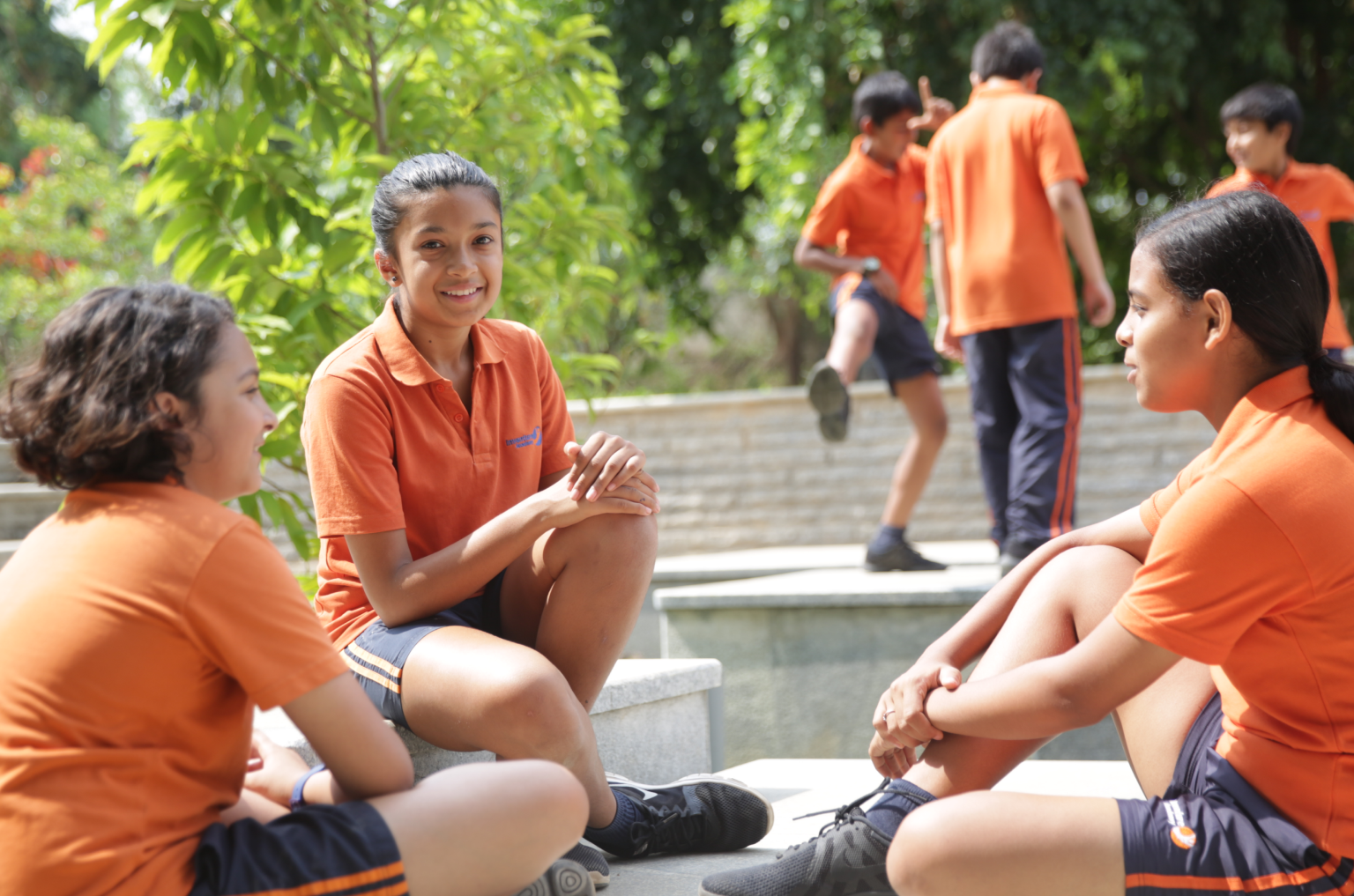The IGCSE and IB boards are two international curricula that frequently stand out when Bangalore parents look for the ideal educational path for their kids. Selecting the appropriate curriculum can greatly impact a child’s development and academic path. Since many international schools in Bangalore provide these courses, the following query frequently comes up:
Table of Contents
ToggleWhich is better, IGCSE or IB?
Both curricula are globally recognised but cater to different learning approaches, age groups, and academic goals. This comprehensive guide will help you understand the core differences between IGCSE and IB boards, so you can make an informed decision for your child’s future.
What is IGCSE?
The International General Certificate of Secondary Education (IGCSE) is a worldwide recognised curriculum that Cambridge Assessment International Education provides. Designed for kids aged 14 to 16, it prepares them for advanced academic studies such as A-levels, the IB Diploma, and other foreign programs.
Overview and Background
IGCSE is part of the Cambridge Pathway and has been adopted by over 10,000 schools in more than 160 countries. It emphasises practical learning, problem-solving, and analytical thinking. Many top IGCSE schools in Bangalore offer a broad, balanced curriculum supporting academic rigour and student individuality.
Age Group and Grades
The IGCSE and IB boards differ significantly in structure. IGCSE is typically taken in Grades 9 and 10 (ages 14–16). It serves as a preparatory stage for students planning to pursue advanced studies in Grade 11 and 12, such as the A-Levels or IB Diploma Programme.
Subjects and Curriculum
IGCSE disciplines are divided into five categories: languages, humanities, sciences, mathematics, and creative/technical. This flexibility facilitates personalised learning routes. Students typically study six to eight subjects, depending on their interests and future ambitions.
Assessment and Evaluation
Depending on the subject, IGCSE students are evaluated using written exams, practical assessments, oral tests, and coursework. The grades range from A* to G, with A* being the highest. This exam-based assessment lets students concentrate on their academic achievement and outcomes.
What is IB?
The International Baccalaureate (IB) is a non-profit educational organisation headquartered in Geneva, Switzerland. The IB curriculum is known for its comprehensive approach, which promotes intellectual, emotional, personal, and social growth.
Overview and Background
The IB was founded in 1968 and is now implemented in over 5,500 schools across 160 countries. The curriculum emphasises inquiry-based learning, global-mindedness, and critical thinking. Many top IB schools in Bangalore provide a well-rounded experience beyond academic achievements.
IB Programmes (PYP, MYP, DP)
The IB board consists of three major programs:
- Primary Years Programme (PYP) – for students aged 3–12
- Middle Years Programme (MYP) – for students aged 11–16
- Diploma Programme (DP) – for students aged 16–19
This progression ensures continuity and consistent learning outcomes across all stages.
Age Group and Grades
IB is intended for students ranging from early childhood to pre-university levels. The IB Diploma Programme (DP) is equivalent to Grades 11 and 12, and it is most often compared to IGCSE for higher education. The MYP, which runs from Grades 6 to 10, is the phase most commonly likened to IGCSE.
Curriculum and Assessment
The IB curriculum is interdisciplinary, with six subject groups and three major components: Theory of Knowledge (TOK), Extended Essay (EE), and Creativity, Activity, and Service (CAS). Internal evaluations, assignments, and external exams are all part of the assessment process. The DP grading system consists of 45 points.
Key Differences Between IGCSE and IB
Curriculum Structure
- IGCSE follows a subject-based structure with a focus on academic depth.
- IB takes an interdisciplinary, holistic approach with a strong focus on personal development and research skills.
The IGCSE and IB boards offer different learning experiences. While IGCSE emphasises subject mastery, IB encourages students to connect knowledge across disciplines.
IGCSE vs IB: Pros and Cons
IGCSE Pros:
- Flexible subject choices
- Globally accepted qualification
- Strong foundation for advanced studies
IGCSE Cons:
- Less focus on creativity and inquiry
- Assessment-heavy, with a strong exam component
IB Pros:
- Emphasis on holistic development
- Encourages a global perspective and critical thinking
- High acceptance rate in international universities
IB Cons:
- Demanding and intense workload
- Not all students adapt well to the inquiry-based model
How to Choose Between IGCSE and IB in Bangalore
Parents should examine their learning style, academic aspirations, and personality when determining whether IGCSE or IB is preferable for their child. For instance,
- IIGCSE may be a better option if your child thrives in structured situations and prefers subject-specific learning. The IB program could be appropriate if your child is inquisitive and appreciates research and project-based learning. Additionally, look into the possibilities of international schools curricula post-10th grade.
- in Bangalore. Some schools, such as Inventure Academy, provide both programs, allowing parents to transfer depending on their child’s changing requirements.
Conclusion
The decision between IGCSE and IB ultimately comes down to your child’s unique strengths and future goals. Both curricula are exceptional in their own right and provide distinct advantages. At Inventure Academy, we are dedicated to assisting families in making educated decisions that are consistent with their child’s academic potential and personal development.
So, which is better: IGCSE or IB? The answer is not one-size-fits-all. It depends on your child. To make the best decision, organise a visit with one of the top IB schools in Bangalore or look into the academic offers of the top IGCSE schools in Bangalore to discover what best meets your child’s needs. Let Inventure Academy guide you through the IGCSE and IB boards. Whether you select one of the top IB schools in Bangalore or prefer the structure of the top IGCSE schools in Bangalore, we are here to help your child succeed every step.
FAQs
Which is better, IB or IGCSE?
There is no conclusive solution because both curricula serve distinct purposes. IB is more holistic and appropriate for overall growth, whilst IGCSE provides a solid academic foundation. Consider your child’s interests and learning preferences before making a decision.
What are the disadvantages of an IB board?
The IB board’s demanding workload might be unpleasant for some students. It also needs extensive independent research, time management, and self-discipline. Not all students respond well to this inquiry-based format.
Which IGCSE vs IB in Bangalore should you choose?
Consider your child’s long-term academic aspirations. Many international schools in Bangalore offer both the IGCSE and IB board programs. The decision between them is based on the school’s teaching quality, your child’s learning style, and future university aspirations.
Is the IB system American or British?
The International Baccalaureate system is neither American nor British. It is a global curriculum created in Switzerland. It is recognised by universities worldwide, including the United States, the United Kingdom, Canada, Australia, and Europe.
How do universities view IGCSE vs IB?
Top universities accept both IGCSE and IB. The IB Diploma Programme is well-regarded for its rigour and research components. However, IGCSE paired with A-Levels or the IB DP is also a viable academic option. Universities often look at the entire academic record, not simply the curriculum.



